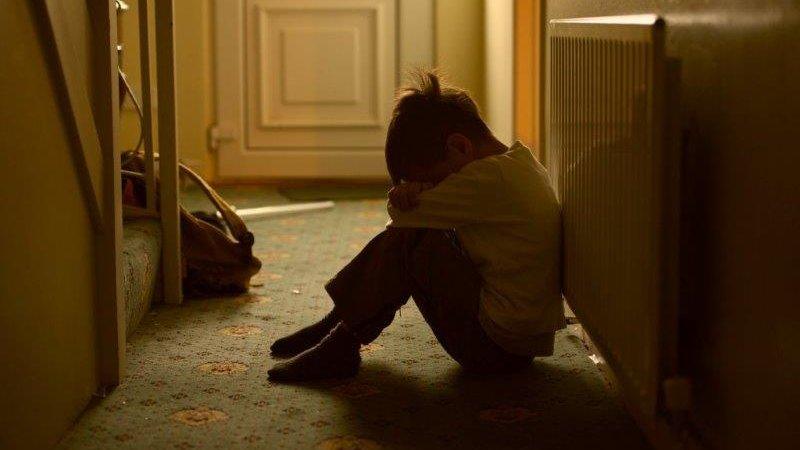Abuse survivors hear Stormont public apology
- Published
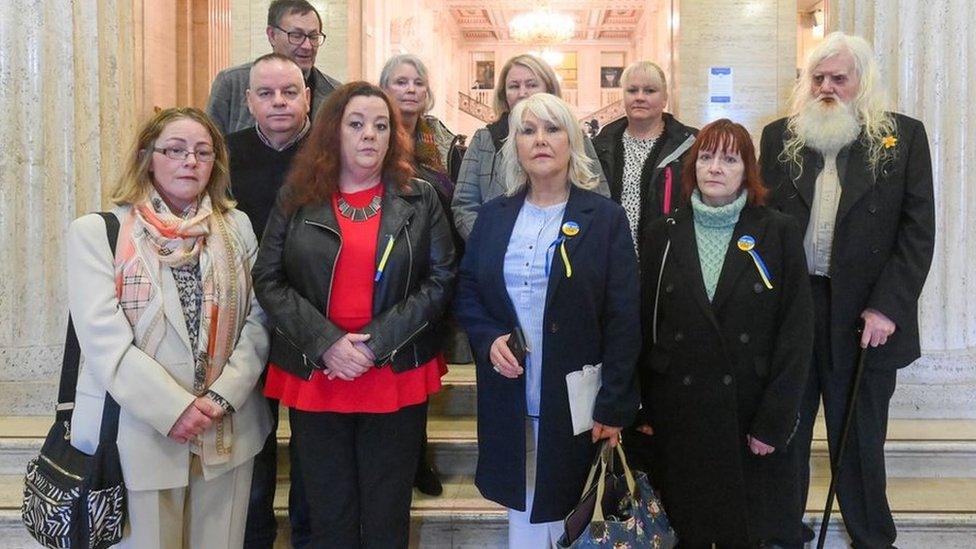
A campaigner for survivors, Margaret McGuckin, pictured with some others who went to Stormont to hear the apology
Survivors of historical institutional abuse in Northern Ireland have been told that the state believes them - and is sorry.
Ministers from the five main Stormont parties made statements of apology in the Northern Ireland Assembly.
It follows a 2017 inquiry which examined the abuse of hundreds of children at Church and state-run institutions over seven decades.
The move was welcomed by some; others said it was too little, too late.
Six institution representatives also spoke in the assembly chamber - four representing Catholic orders, one from the charity Barnardo's and one from a Church of Ireland missionary organisation.
Some survivors, about 80 of whom were present in the assembly chamber, left while those speeches were being made.
The first minister to speak was the Democratic Unionist Party's (DUP) Michelle McIlveen, who said there was no "excuse or defence" for what happened.
"We are sorry that the state did not protect you," the education minister added.
The Historical Institutional Abuse (HIA) Inquiry examined the period from 1922 to 1995 and found there had been widespread and systemic abuse at institutions.
Its late chairman, Sir Anthony Hart, had recommended compensation, an apology and a permanent memorial to be erected at Stormont.
'Children suffered in vile ways'
Alliance Party leader and Justice Minister Naomi Long said it was "fitting and proper" that the apology was made in the assembly.
"This is where our laws are made, where we - ministers and those responsible for governing - are held to account. We are united in our acceptance of responsibility," she explained.
Victims of historical institutional abuse in NI have been told that the state believes them
A minute's silence was held in the chamber, followed by a brief applause, before the statements began.
Infrastructure Minister Nichola Mallon, from the Social Democratic and Labour Party (SDLP), told the chamber that the inquiry "shone a light on a dark, harsh and bleak period of our past".
She also said the "guilt and shame" of what happened to survivors has never been their burden to bear, but belonged to "those who should have protected you".
Some of the children were sent to Rubane House in Kircubbin, County Down, run by the De La Salle brothers
Health Minister and Ulster Unionist Party (UUP) MLA Robin Swann said victims and survivors had shown "courage" and had "taught us much in government".
"Systemic abuse should never have happened - we are truly sorry that it did happen and we commit fully to ensuring that it will never happen again," he said.

Five long years after this apology was first recommended, today saw five Stormont ministers finally delivering it.
Addressing directly those men and women whose childhoods where stolen, in places where they were meant to be protected.
From early this morning, the Great Hall at Stormont was filled with emotion as survivors arrived in different groups to take their places.
Some of the tireless campaigners smiled as they reflected on reaching this step of their journey.
But others felt while the politicians hit the mark, the institutions had offered a cold, half-hearted apology.
For a time, making this moment happen seemed out of reach, but now 11 March will always belong to these survivors.

Finance Minister Conor Murphy, from Sinn Féin, recognised it had taken "too long" for the apology to be made.
"We acknowledge that the delay in progressing this recommendation from the Hart report has further added to the stress that you experienced. For this, we are sorry," he said.
'Survivors' courage'
Fiona Ryan, commissioner for victims of institutional childhood abuse, also spoke during the proceedings and paid tribute to the "courage of all survivors".
"The fact that the inquiry happened is due to the victims and survivors themselves who fought to be seen and heard by an officialdom that was largely blind and deaf to the abuse they had suffered, to their anger and to their ongoing pain," she outlined.
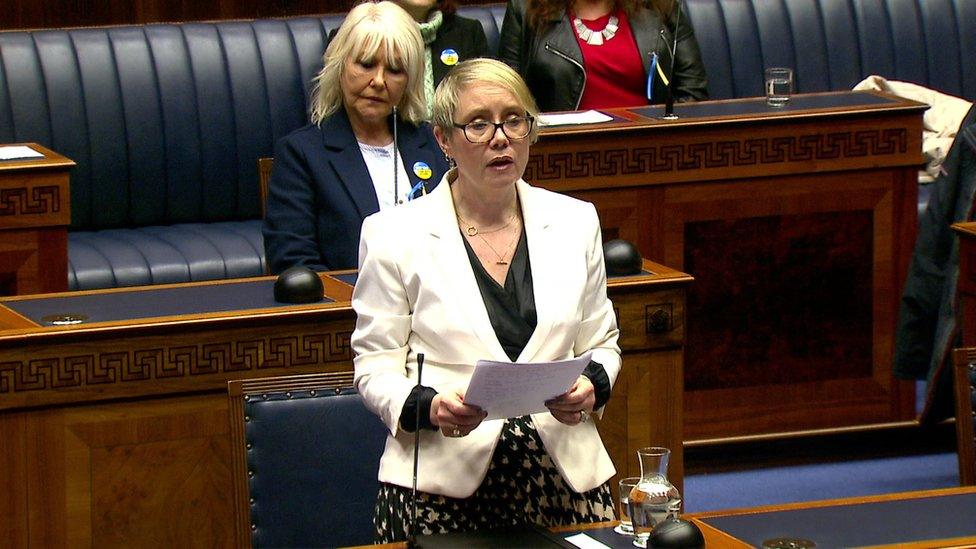
Commissioner Fiona Ryan paid tribute to the courage shown by survivors
Addressing members at the start of proceedings, Speaker Alex Maskey said he was mindful that many victims of abuse had died before they could hear an apology.
While Stormont's power-sharing institutions were suspended in 2019, Westminster passed legislation to allow the establishment of a redress board for payments.
But the delivery of an apology required ministers in the Stormont Executive - Northern Ireland's devolved government - to be in place.
It was initially due to be offered by the first and deputy first ministers in March, but was in doubt after the executive collapsed again last month.

Sir Anthony Hart recommended a compensation scheme, an apology and a permanent memorial to be erected at Stormont
The DUP's withdrawal of Paul Givan as first minister meant Michelle O'Neill could not remain as deputy first minister.
'Lack of love and understanding'
Following the ministers' statements, representatives from six of the institutions highlighted in the HIA Inquiry made statements.
Br Francis Manning from De La Salle Brothers said his organisation's "actions and sometimes inaction caused pain and hurt and for our part we wish to say we are sorry and offer our sincere apology".
From the Sisters of Nazareth, Sr Cornelia Walsh offered a "heartfelt apology" and acknowledged there was "systemic physical abuse and that bullying was prevalent".
Sr Uainin Clarke, representing Sisters of St Louis, apologised for the "harshness and a lack of love and understanding" experienced by children and teenagers in their care.
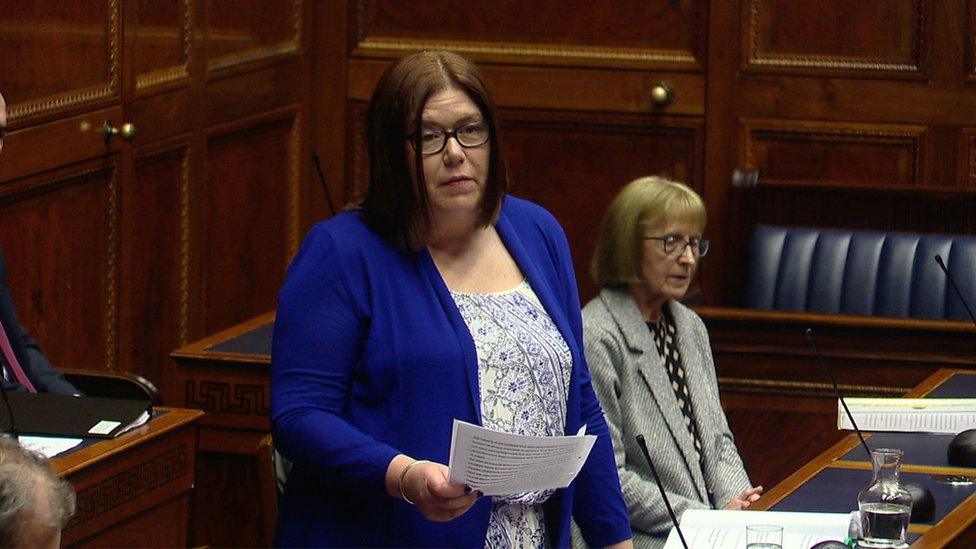
Michele Janes from Barnardo's said children had experienced a climate of fear in its care
Sr Cait O'Leary, from Good Shepherd Sisters, accepted that "mistakes were made" in the care provided to girls and young women and they did not receive "appropriate, long-term, child-centred care".
The director of Barnardo's in Northern Ireland, Michele Janes, said the charity acknowledged organisational failings which had created "a climate of fear and insecurity" when children should have felt "nurtured and safe".
Rev Mark Jones, from Irish Church Missions, said the organisation apologised for failing to "detect and prevent" sexual abuse endured by children in the care of Manor House Home in Lisburn.
After these remarks, Margaret McGuckin from Savia said she felt "broken" after a long campaign.
Allow X content?
This article contains content provided by X. We ask for your permission before anything is loaded, as they may be using cookies and other technologies. You may want to read X’s cookie policy, external and privacy policy, external before accepting. To view this content choose ‘accept and continue’.

Ms McGuckin said while she believed the ministers were sincere in their apologies, she welcomed the statements by the organisations "with a pinch of salt".
"More damage was caused throughout this campaign than perhaps was in those institutions," she told reporters.
Jon McCourt from the Londonderry-based group, Survivors North-West, said the politicians' words were "touching".
However, he said the church representatives spoke "without emotion".
"If what happened today was the best that the church could offer by way of an apology they failed miserably," he said.
Mr McCourt said he does not believe the church had "atoned" for its actions and called for religious organisations to make a "significant contribution" to the survivors' redress scheme.
Marie-Therese Rogers-Maloney, who suffered abuse at Nazareth House in Belfast, said she did not like the apology she received but it would represent "the end of the road" for her journey.
She told BBC News NI's Evening Extra she "hated" the institution "for its cruelty, for its lack of compassion; they had no empathy for any child".
'Shame on us'
In a separate statement, Archbishop Eamon Martin, the head of the Catholic Church in Ireland, apologised "to all those who suffered from their horrific experience in Church-run institutions, and to their loved ones".
Many were "blinded" in the church to the "shocking neglect, sins and crime being perpetrated in their midst", he continued.
"Shame on us."
The lack of a first and deputy first minister in place to deliver a statement meant the apology was "stolen", according to Gerry McCann, from the Rosetta Trust.
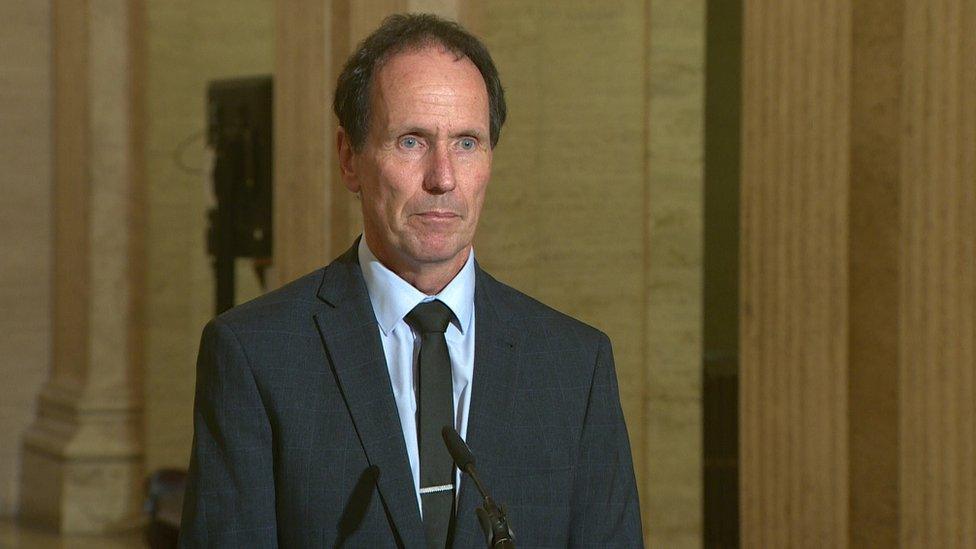
Gerry McCann said the apology was stolen without a first and deputy first minister in place
"Today was very tough in many ways for survivors, but to come to parliament and expect an apology from the first and deputy first minister and that didn't happen - that in itself is an indictment of our politics," he said.
"I can't help but feel the opportunity was there for the political parties to reinstate the first minister, even for two hours."
Earlier this week, Northern Ireland Secretary of State Brandon Lewis welcomed the apology to victims and survivors of historical and institutional abuse.
He said: "It was only right they are now receiving an apology for the abhorrent abuse they suffered."
Related topics
- Published11 March 2022
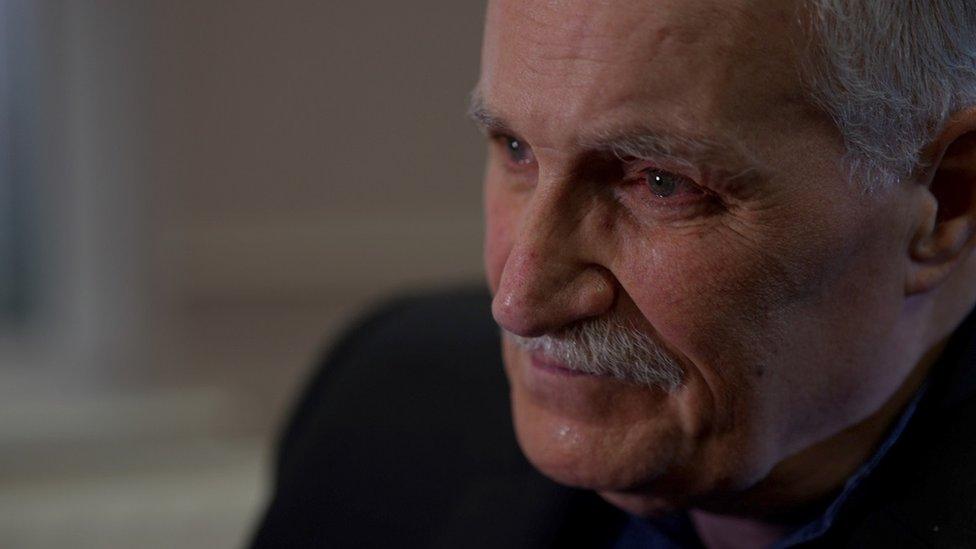
- Published11 March 2022
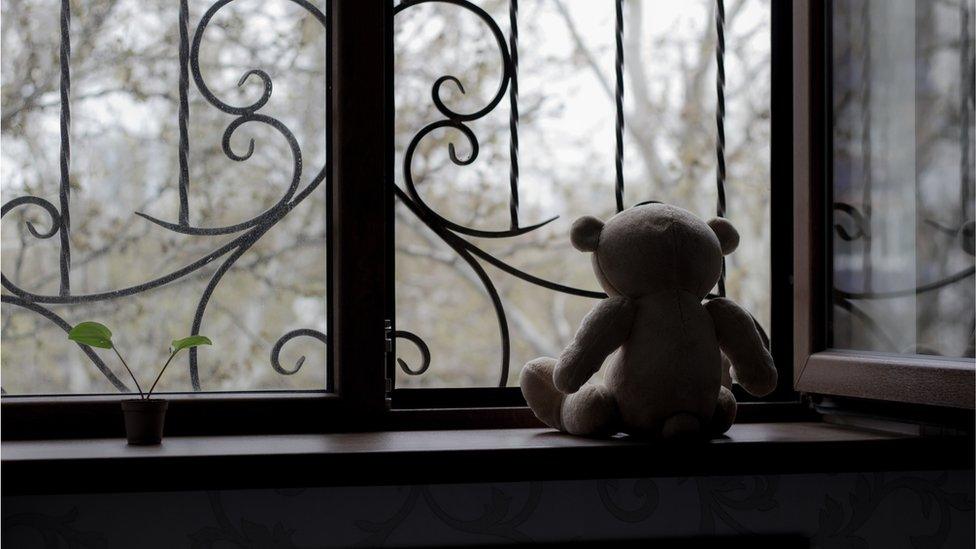
- Published5 November 2019
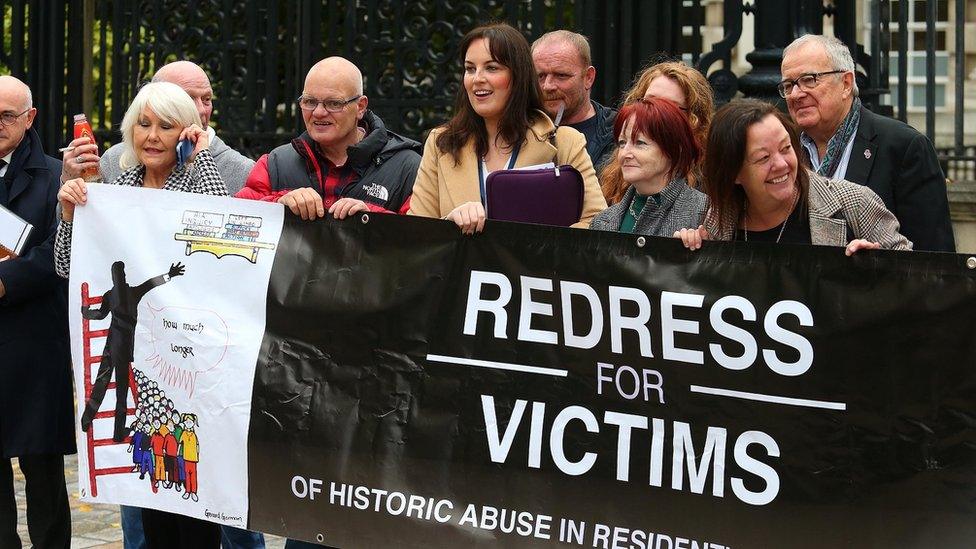
- Published20 January 2017
